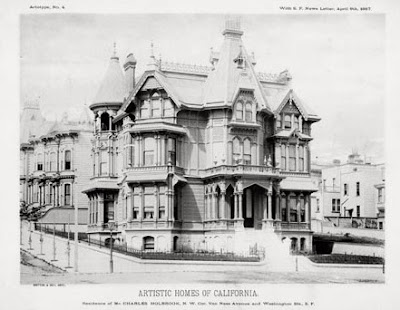 |
| The Holbrook Family Mausoleum on Millionaire's Row and Charles Holbrook |
After hearing about the discovery of gold in California he embarked on the steamer Georgia at New York on April 13, 1850. He went down to the coast of Panama, walked over the Isthmus, boarded the sailing vessel Thomas P. Hart and landed in San Francisco.
After spending eighteen months in the mines, he went to work for the iron merchants Howes & Prader in Sacramento. He eventually worked in the lumber business in El Dorado County, with a stove and metal merchant in Sacramento and as a partner at J.D. Lord & Company. However, the severe storms and floods from the winters of 1861 and 1862 Sacramento pretty much ruined his business.
 |
| R.C. Gridley's famous flour sack |
In 1864, at the height of the Civil War, when many western states still had split loyalties between the North and the South, the little town of Austin, Nevada held its first mayoral election. The pro-Confederate Democrats nominated David Buel to run against the pro-Union Republican Charles Holbrook.
On election day, a brass band led a parade down Main Street and men placed wagers on the election outcome. One bet involved a guy named R.C. Gridley who told his friend Dr. Henry Herrick that if Buel lost the election he'd carry a 50-pound sack of flour a quarter-mile up Main Street marching to "Old John Brown."
Holbrook eked out a victory and the bet became a big deal in town, as citizens gathered to watch Gridley pay up his bet. After he completed his march, Gridley placed the sack on a stand and the men, most of whom had been imbibing at the local saloon all day, began bidding on the flour sack. The flour sack ultimately went for $350 with the money going to the Sanitary Fund, a forerunner of the American Red Cross. As a challenge, the bidding continued on the flour sack, eventually raising $4,349.75.
After news of Gridley's Sack spread to adjoining communities, bidding took place over and over as a means to raise money for the Sanitary Fund. Although no final tally was ever formally done, accounts estimate that between $100,000 to $275,000 was raised for the Civil War soldiers. ($1.5-$4.5 million in today's dollars!). The town of Austin decided to commemorate the fundraising success by adopting a coat of arms with an image of the sack and the motto "SANITARY FUND $5,000" inscribed onto it. The sack is now on display at he Nevada Historical Society in Reno.
 |
| The Holbrook Libray at the Pacific School of Religion |
He developed the Holbrook block at Beale and Market streets in San Francisco, as well as serving as a trustee of the Pacific School of Religion, the Lux School of Industrial Training, the Hospital for Children of San Francisco and the Golden Gate Kindergarten Association. In 1883 he was teamed with educator/philanthropist Sarah B. Cooper and Archbishop George Thomas Montgomery in organizing the Associated Charities in San Francisco.
 |
| The Holbrook Home in San Francisco |
He died on July 25, 1925, at the age of 94.
After his death, he was honored for his contributions to society by having a 297-acre stand of redwood trees named after him just north of Garberville, which was added to the California State Park system.
Sources: "The San Francisco Bay Region" by Bailey Millard, Berkeley Daily Gazette, Oakland Tribune, The San Francisco Call, The Windsor Page, Wikipedia, Ancestry.com, "It Happened In Nevada: Remarkable Events that Shaped History" by Elizabeth Gibson

